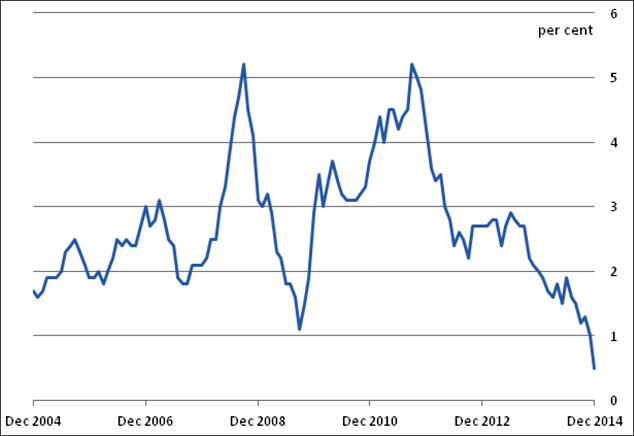
What happened?
UK inflation fell to just 0.5% in December, lower than the 0.7% figure many economists had forecast. That equals the lowest level ever recorded (in May 2000).
CPI 12-month inflation rate for the last ten years
Source: Office for National Statistics
Sterling was trading at a low of $1.5083 following the announcement, down from $1.5119 immediately before it. The yield on five-year gilts also fell, to below 1%.
The figures released this morning by the Office for National Statistics (ONS) fell well short of the government’s official target of 2%, though George Osborne did his best to put a positive spin on the results:
“Inflation is 0.5% – lowest level in modern times”, the Chancellor tweeted. “Welcome news with family budgets going further & economic recovery starting to be widely felt.”
Osborne will receive an open letter from the Bank of England governor, Mark Carney, on 18 February explaining why the government’s target is so out of kilter with official results.
So what does this mean?
This fall in inflation has two “immediate impacts on households”, said the Guardian:
1: Earnings are rising faster than prices, so real wages are growing.
2: There’s less chance of the Bank of England raising interest rates this year.
Carney, speaking early this afternoon on BBC News, said interest rate rises – if and when they do come – may be “a little more gradual and a little more limited”.
What’s next?
“Plunging oil costs and supermarket price wars are driving the sharp slowdown in UK inflation.” said Bloomberg, and there’s no sign that inflation will stop falling.
“Most economists expect inflation to continue to fall over the next few months, with oil prices at a near six-year low amid concerns of a bigger oil surplus in coming months.” said the Financial Times.
“The rapid fall in crude prices is likely to deliver a spending boost to hard-pressed consumers.”
What should I do right now?
With mortgage rates at a record low, there has never been a better time to fix your mortgage.